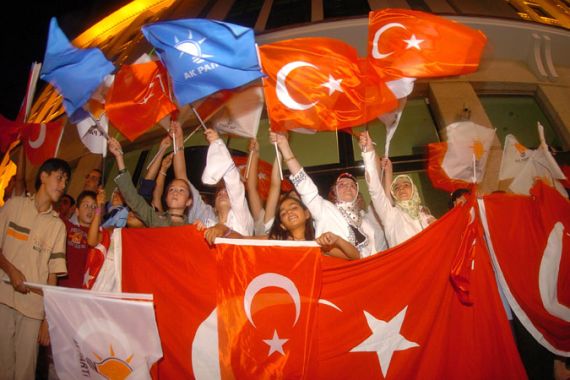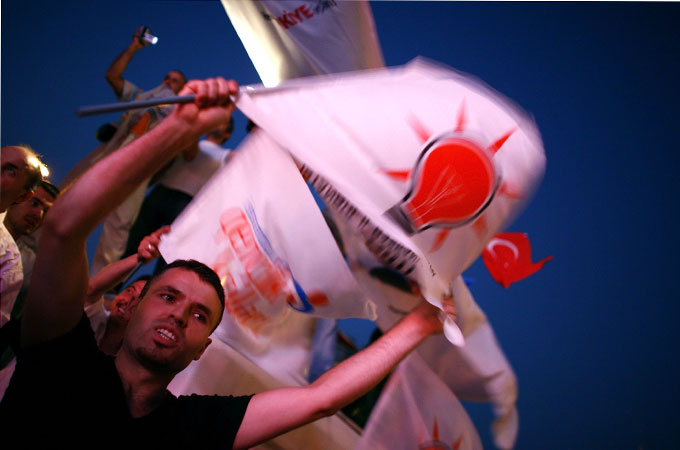A triumph for Turkish democracy
Prime Minister Erdogan’s victory brings aspirations of unity and increasing regional power for Turkey.

 |
| Supporters of Erdogan’s AK Party celebrated late into the night after voters gave the pro-business, religious-rooted party a mandate for reform [GALLO/GETTY] |
The June 12 election, which gave the ruling Justice and Development Party (AKP) 50 per cent of the votes and a clear majority in the parliament, is a victory not only for Prime Minister Erdogan but also for Turkish democracy. With a new mandate to govern for another term, the AKP will now seek a broad consensus to write a new constitution and find a peaceful solution to the Kurdish issue.
Since the start of multi-party politics in 1946, no political party in Turkey has been able to rule for three consecutive terms while increasing its votes. The AKP came to power at the end of 2002 and has since then implemented numerous political and judicial reforms, boosted the Turkish economy, and expanded foreign policy. The results from Sunday’s elections show that the vast majority of the Turkish public approve of this model of development that has been spearheaded by Prime Minister Erdogan.
The opposition parties too have made some gains. The main opposition party, the People’s Republican Party (CHP), known for its radical secularism and pro-establishment stance, ran an issue-based campaign and increased its seats in the parliament. Contrary to expectations, the Nationalist Movement Party (MHP) passed the 10 per cent threshold but lost seats. The pro-Kurdish coalition group, known for its ties to the outlawed Kurdish terrorist group PKK, ran with independents and won 36 seats. Other smaller parties have fallen by the wayside.
Given decades of military coups and anti-democratic practices, this election once more proves the strength of Turkish democracy. The AKP’s success comes mainly from its ability to maintain a balance between democratization and reforms on the one hand, and nation-wide services and steady economic development on the other. Markets have already responded positively to the election results, and the strength of Turkish economy is expected to continue.
On the domestic scene, two major issues will dominate the political agenda for the government. The first is the writing of a new constitution. The current Turkish constitution was written after the 1980 military coup by the army generals. It favours the state over the individual and suffers from a major deficit of democracy and civil liberties. Though amended numerous times, it is an outdated constitution and cannot meet the demands of Turkey in the 21st century. There is a general consensus on the need to write a new constitution.
Considering the polarisation of Turkish society over key political issues, however, this will not be an easy task. As Prime Minister Erdogan said at his victory speech on Sunday night, he will seek a broad consensus with the opposition parties as well as NGOs for the new constitution. The opposition parties will do well to respond to this call in the positive and work with the government to write a new constitution that will move Turkey into the league of advanced democracies of the world.
The second issue that awaits urgent attention is the Kurdish situation. A painful outcome of years of denial, oppression, state nationalism and negligence, the Kurdish issue has cost Turkey more than forty thousand lives and hundreds of billions of dollars, shaping Turkey’s national security perception since the mid-1980s. It has created oppositional identities and fed both Turkish and Kurdish nationalism in a destructive way.
Despite the opposition of the army and the opposition parties CHP and MHP, the AKP government took bold steps in acknowledging the reality of the Kurdish issue and allowed the use of Kurdish in public. The Democratic Initiative, launched to address the issue, is comprised of three components: democratic rights, economic development and the disarmament of the PKK. While considerable progress has been made in the first two areas, PKK has so far refused to disarm, making a comprehensive political solution impossible.
The June 12 elections also have important bearing on Turkey’s foreign policy. With the Arab Spring turning into Arab turmoil in Libya, Yemen and Syria, Turkey has emerged as an island of stability. Contrary to some claims, the Arab Spring has strengthened rather than weakened Turkey’s position in the region. Turkey’s support for change in the Arab world has been well received by Arab publics from Egypt and Libya to Tunisia and Syria. Turkey is certain to increase its multi-levelled engagement policy in the Arab world.
The recent events in Syria have serious consequences for Turkey as well. Now that the elections are over, Prime Minister Erdogan is likely to spend more time on the Syrian situation. Turkey’s efforts to bring about peaceful change in Syria will continue. Ankara has already been urging Damascus to make reforms and refrain from using violence against civilians. The response of the Syrian regime so far has been unhelpful and disappointing, prompting PM Erdogan to call recent attacks by Syrian forces “savagery” and “inhumane”. If Damascus continues this policy of brutal repression, it is likely to face serious isolation in the region.
Having voted for the ruling party three times in a row, Turkish voters have renewed their confidence in Prime Minister Erdogan and his rule in the country. While the new constitution and the Kurdish issue will require a lot of political skill, the new popular mandate will empower Turkish democracy and increase Turkey’s profile domestically and regionally.
Ibrahim Kalin is senior adviser to the prime minister of Turkey.
The views expressed in this article are the author’s own and no not necessarily represent Al Jazeera’s editorial policy.
